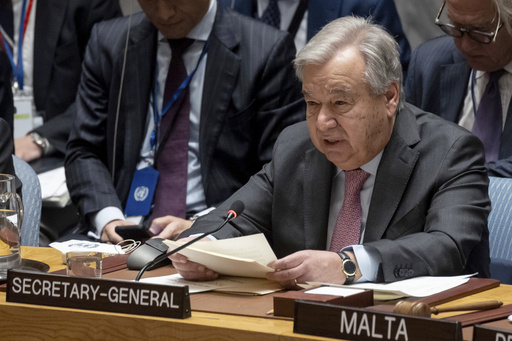UNITED NATIONS (AP) — The U.N. secretary-general will tell the Security Council next week that both Israel and Hamas are violating children’s rights and leaving them exposed to danger in their war to eliminate each other.
The secretary-general annually makes a global list of states and militias that are menacing children and threatening them. Parties on the list have ranged from the Kachin Independence Army in Myanmar to — last year — Russia during its war with Ukraine.
Now Israel is set to join them.
António Guterres sends the list to the Security Council and the council can then decide whether to take action. The United States is one of five veto-wielding permanent council members and has been reluctant to act against Israel, its longtime ally.
Another permanent member is Russia and when the United Nations put Russian forces on its blacklist last year for killing boys and girls and attacking schools and hospitals in Ukraine, the council took no action.
The inclusion of Israel this month will likely just put more of a global spotlight on the country’s conduct of the war in Gaza and increase already high tensions in its relationship with the global body.
The preface of last year’s U.N. report says it lists parties engaged in “the killing and maiming of children, rape and other forms of sexual violence perpetrated against children, attacks on schools, hospitals and protected persons.”
The head of Guterres’ office called Israel’s U.N. ambassador, Gilad Erdan, on Friday to inform him that Israel would be in the report when it is sent to the council next week, U.N. spokesman Stéphane Dujarric told reporters.
The militant Hamas and Palestinian Islamic Jihad groups will also be listed.
Israel reacted with outrage, sending news organizations a video of Erdan berating the head of Guterres’ office — who was supposedly on the other end of a phone call — and posting it on X.
“Hamas will continue even more to use schools and hospitals because this shameful decision of the secretary-general will only give Hamas hope to survive and extend the war and extend the suffering,” Erdan wrote in a statement. “Shame on him!”
The Palestinian U.N. ambassador said that adding Israel to the “‘list of shame,’ will not bring back tens of thousands of our children who were killed by Israel over decades.”
“But it is an important step in the right direction,” Riyad Mansour wrote in a statement.
Israeli Prime Minister Benjamin Netanyahu said “the U.N. put itself on the black list of history today” as the move heightened the long-running feud between Israel and the U.N. and even the routine mechanics of Israel’s dealings with the world body are now fraught with tensions.
The normally equanimous secretary-general’s spokesman broke from the good-natured tone of his noon briefing when asked to discuss the latest development.
“The call was a courtesy afforded to countries that are newly listed on the annex of the report,” Dujarric said. “The partial release of that recording on Twitter is shocking and unacceptable and frankly, something I’ve never seen in my 24 years serving this organization.”
Condemnation of the secretary-general’s decision appeared to bring together Israel’s increasingly fractious leadership — from the right-wing Netanyahu and Erdan to the popular centrist member of the War Cabinet, Benny Gantz.
Gantz cited Israel’s first prime minister, David Ben-Gurion, as saying “it matter not what say the goyim (non-Jews), what is important is what do the Jews.”
For month Israel has faced heavy international criticism over civilian casualties in Gaza and questions about whether it has done enough to prevent them in the eight-month-old war. Two recent airstrikes in Gaza killed dozens of civilians.
U.N. agencies warned Wednesday that over 1 million Palestinians in Gaza could experience the highest level of starvation by the middle of next month if hostilities continue.
The World Food Program and the Food and Agriculture Organization said in a joint report that hunger is worsening because of heavy restrictions on humanitarian access and the collapse of the local food system in the eight-month Israel-Hamas war.
The proportion of Palestinian women and children being killed in the Israel-Hamas war appears to have declined sharply, an Associated Press analysis of Gaza Health Ministry data has found, a trend that both coincides with Israel’s changing battlefield tactics and contradicts the ministry’s own public statements.
The trend is significant because the death rate for women and children is the best available proxy for civilian casualties in one of the 21st century’s most destructive conflicts. In October, when the war began, it was above 60%. For the month of April, it was below 40%.
Yet the shift went unnoticed for months by the U.N. and much of the media, and the Hamas-linked Health Ministry has made no effort to set the record straight.
This website uses cookies so that we can provide you with the best user experience possible. Cookie information is stored in your browser and performs functions such as recognising you when you return to our website and helping our team to understand which sections of the website you find most interesting and useful.
